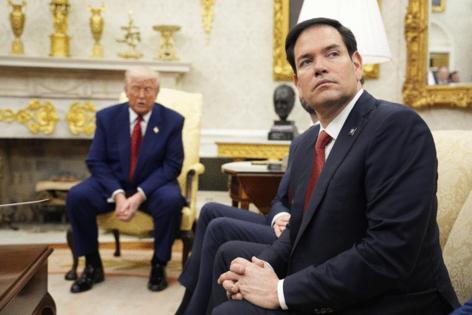Once a champion for Venezuelans, Rubio endorses Trump decision to end protected status for them
Published in Political News
Secretary of State Marco Rubio, once a stalwart champion of Venezuelan immigrants, supports President Donald Trump’s decision to end the deportation protections for hundreds of thousands of people already in the United States who fled dictatorship and humanitarian crises in their home country.
Newly released court documents show that Rubio, the Miami-born child of Cuban exiles, endorsed the Trump administration’s move to end Temporary Protected Status for Venezuelan nationals shortly after the president took office.
“Designating Venezuela under TPS does not champion core American interests or put America and American citizens first. Therefore, it is contrary to the foreign policy and the national interest of the United States,” Rubio wrote in a Jan. 31 letter to Homeland Security Secretary Kristi Noem. Over half a million Venezuelan nationals in the United States have TPS.
Rubio’s letter became public earlier this month as part of the Trump administration’s appeal of a federal judge’s ruling blocking the TPS termination. The revelation marks a sharp reversal for Rubio, who for years supported TPS for Venezuelans, including when he was a U.S. senator during the Biden administration.
The State Department did not respond to Miami Herald questions about why Rubio changed his opinion about Venezuela’s Temporary Protected Status and how he reconciles his stance with his hard-line views on the state of the South American country under strongman Nicolas Maduro.
In 2017, during Trump’s first term, Rubio urged then-Secretary of State Rex Tillerson and then-Homeland Security Secretary John Kelly to expand Temporary Protected Status so Venezuelans would qualify for TPS.
“Given the ongoing political, economic, social, and humanitarian crisis in Venezuela,” Rubio wrote, “it is not in the best interests of the United States to deport non-violent Venezuelan nationals back to the country at this time.”
In 2019, Rubio was the only Republican co-sponsor for the Venezuela TPS Act, which would have designated Venezuela for the federal protections. In 2021, President Joe Biden administration first designated Venezuela for TPS, citing the ongoing humanitarian, political, and economic crises in the country, a move that Rubio publicly welcomed.
Then, after the Biden administration granted TPS for Venezuelans, Rubio requested an expansion so more Venezuelans would qualify. Rubio warned Biden that failing to do so could amount to a “very real death sentence” for many who had fled Maduro’s regime. To be eligible for TPS, people must have arrived in the United States before a certain cut-off date, but Homeland Security can change that deadline if new conditions arise in the designated country.
However, Rubio’s position took a 180-degree turn after Trump’s return to the White House. In his Jan. 31 letter, he told Noem that TPS “facilitates and encourages mass migration.”
“The State Department will no longer undertake any activities that facilitate or encourage mass migration. Our diplomatic relations with other countries, particularly in the Western Hemisphere, will prioritize securing America’s borders,” he wrote.
A federal judge in California recently blocked the Trump administration’s decision to end TPS for Venezuela for now. Homeland Security says it “has every intention of ending Venezuela TPS as soon as it obtains relief from the court order.”
Rubio’s abrupt change in view has drawn scathing criticism from immigration advocates and human rights organizations, who characterize his actions as a betrayal. Carlos Pereira, a Venezuelan-American activist and former Democratic candidate for the Florida House of Representatives the and Doral City Council, said he was “shocked” to read Rubio’s letter to DHS.
“Rubio was once a voice for us. Now he is fueling policies that treat us as enemies. I hope he reconsiders and publicly corrects these recommendations, so our community can live in peace and continue contributing to this nation we now call home,” he said.
Pereira called it saddening and disheartening to “see the person now leading our nation’s diplomacy, someone from our very own community who once stood with us, now misinforming the federal administration about who we are.”
Adelys Ferro, executive director of the Venezuelan American Caucus, and one of the first Venezuelan-Americans who advocated for TPS for Venezuelans, told the Miami Herald that revoking TPS for Venezuelans places tens of thousands of lives at risk and undermines long-standing U.S. commitments to humanitarian protections.
“It’s devastating to see that the same Marco Rubio who championed TPS for Venezuelans — who pushed for protection and stood with our community — is now the one turning his back on us,” Ferro said. “Sadly, we’re not surprised, but that doesn’t make it any less painful.”
On Feb. 5, Homeland Security published a Federal Register notice ending TPS for Venezuelans. The agency stated that the country had made progress in areas like public health, crime, and the economy. The agency suggested conditions were now “safe” for Venezuelans to return.
The day before, during his first official trip to Latin America as Secretary of State, Rubio had characterize d Venezuela as an enemy of humanity responsible for a migration crisis. When asked about his comments during his stop in the Dominican Republic that same trip, Rubio doubled down.
“I do not know how else to talk about a regime that has forced about 8 million citizens to leave Venezuela,” he said. “They imprison, they torture innocent individuals.”
©2025 Miami Herald. Visit at miamiherald.com. Distributed by Tribune Content Agency, LLC.




























































Comments